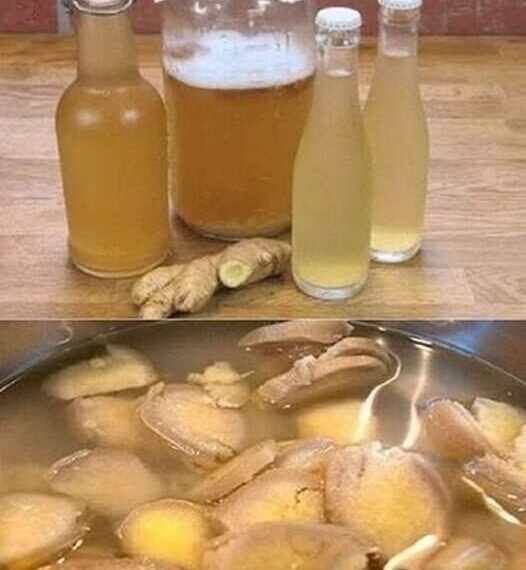A science-backed, practical guide — what the research says, how to prepare it, who may benefit, and important safety notes.
Quick summary
Ginger water (hot or cold water infused with fresh ginger) contains active compounds — principally gingerols and shogaols — that have measurable effects on metabolism, gastrointestinal function, and inflammation. Clinical and laboratory studies suggest modest benefits for increasing energy expenditure and appetite suppression (helpful for weight management), improving gastric motility and indigestion symptoms, and reducing pain and inflammation related to osteoarthritis and other musculoskeletal conditions. These effects are real but generally modest; ginger is best thought of as a useful complementary measure rather than a magic cure.
How ginger works (short textbook version)
- Thermogenesis & appetite: Ginger stimulates processes that increase post-meal energy expenditure (the “thermic effect”) and can reduce subjective appetite, which may support weight-management efforts.
- Gastrointestinal motility & anti-nausea effects: Ginger accelerates gastric emptying and acts as a prokinetic agent; it also reduces nausea and some functional dyspepsia symptoms.
- Anti-inflammatory & analgesic actions: Ginger inhibits inflammation pathways (COX/LOX, prostaglandin synthesis) and shows small-to-moderate reductions in joint pain in clinical trials, likely through its antioxidant and anti-inflammatory compounds.
Evidence: What the studies actually found
1) Metabolism and “fat-burning”
A randomized human study tested a hot ginger beverage and reported an increase in post-meal energy expenditure (thermogenesis) and reduced feelings of hunger compared with control, suggesting a potential role in weight management. The effect size was modest — not a substitute for diet and exercise — but biologically plausible.
Animal and cell studies also show ginger extracts influence fat metabolism and insulin sensitivity; one paper on “ginger water” in animal models reported reduced weight gain and improved metabolic markers (useful mechanistic support, but animal data do not prove the same magnitude of effect in humans).
Bottom line: ginger water may slightly boost calorie burn and curb appetite for some people, but expect modest effects and pair it with healthy eating and activity.
2) Digestion and gastrointestinal comfort
Systematic reviews and clinical trials show that ginger can speed gastric emptying, reduce bloating and feelings of fullness, and reduce nausea (used widely for pregnancy nausea and chemotherapy-related nausea). Studies of functional dyspepsia and other GI complaints report symptom improvements versus placebo in multiple trials.
Bottom line: ginger water is a reasonable, low-risk option to try for indigestion, bloating, and nausea relief.
3) Bone/joint pain and osteoarthritis
Clinical trials of standardized ginger extracts and topical formulations have shown small-to-moderate reductions in pain and symptoms of knee osteoarthritis. One of the widely cited clinical trials reported statistically significant symptom reduction versus placebo with good tolerability. Reviews of clinical trials support ginger’s analgesic and anti-inflammatory effects for musculoskeletal pain, though results vary by formulation and dose.
Bottom line: ginger (oral or topical) can be a helpful adjunct to standard osteoarthritis care for some people, but it is not a replacement for medical treatment when joint damage is advanced.
Practical recipe: How to make effective ginger water
Simple, flexible, and easy to adjust.
Classic hot ginger water (makes ~1 liter)
- Peel and slice 40–60 g (about 1.5–2 oz) fresh ginger root (adjust to taste).
- Bring 1 L (4 cups) of water to a boil. Add ginger slices.
- Simmer gently for 10–20 minutes (longer infusion → stronger).
- Strain into a jar. Drink hot, or chill and add lemon/honey if desired.
Dosage guidance used in many trials and traditional practice ranges widely — typical daily intake from food or tea is roughly 500 mg — 2 g of ginger root equivalent up to a few grams; clinical trials sometimes use higher standardized-extract doses. Start lower (a cup per day) and see how you tolerate it.
Variations: cold infusion (steep cold water 4–8 hours in fridge), add lemon or mint, cinnamon, or a teaspoon of honey. For joint pain some studies used standardized extracts rather than plain water infusion — if seeking stronger anti-inflammatory effect, standardized supplements (under clinician guidance) were what many trials employed.
How quickly might you see benefits?
- Digestion/nausea: often within hours to days for nausea and GI upset.
- Appetite/weight effects: small changes measurable in short-term studies (hours–weeks), but meaningful body-weight changes require sustained diet/exercise changes over months.
- Joint pain: some trials reported improvement over weeks (for oral therapy) and topical applications showed benefits in similar timeframes.
Safety, interactions, and cautions
- Generally safe in culinary amounts and typical tea doses. Mild side effects can include heartburn, stomach upset, or diarrhea. Healthline
- Blood-thinning effects: ginger can have mild antiplatelet effects. If you take anticoagulants (warfarin, DOACs) or have a bleeding disorder, consult a clinician before high-dose ginger supplements.
- Pregnancy: ginger is commonly used for pregnancy nausea and many studies support short-term use at moderate doses; still, pregnant people should check dosage with their provider.
- Surgery: avoid large doses in the days before surgery because of potential bleeding risks.
- Medication interactions: possible interactions with blood sugar–lowering drugs, blood pressure meds, and antiplatelet/anticoagulant drugs — check with your prescriber if you take these.
Practical tips to maximize benefit
- Use fresh ginger root for the best gingerol/shogaol profile in water infusions.
- Make ginger water part of a healthy routine (hydration + balanced diet + exercise) — it helps more as a small multiplier, not a standalone fix.
- If you’re targeting joint pain, consider discussing standardized ginger extract supplements or topical ginger formulations with your clinician, since many clinical trials used these standardized products.
Bottom-line takeaways
- Modest metabolic boost: Ginger can slightly increase post-meal thermogenesis and reduce hunger — this might help weight-management efforts when combined with diet and exercise
- Digestion helper: Good evidence supports ginger for nausea, bloating, and improving gastric emptying. It’s a low-risk first-line home remedy for these issues.
- Pain & inflammation: Trials show ginger (oral or topical, often standardized extracts) reduces osteoarthritis pain modestly; useful as an adjunct to conventional care.
Final Thoughts
In summary:
- Ginger water (or ginger infusions) is a low-risk dietary beverage with good plausibility and some supporting evidence for benefits in digestion and moderate support for metabolism/weight control and joint/muscle pain relief.
- The science is strongest for digestive benefits, moderate for metabolic/fat-burning effects (in animals, less so in humans), and emerging but limited for bone/joint pain relief or bone disease.
- If you’re considering using ginger water:
- Use it as part of a healthy diet and active lifestyle (not instead of).
- Aim for consistency (e.g., daily or before meals).
- Pay attention to how you feel — some benefit may be subtle.
- Combine with other healthy habits (balanced nutrition, sufficient protein, exercise, adequate sleep).
- Monitor for any side-effects or interactions with your medications.
- As always, if you have specific medical conditions (e.g., obesity, arthritis, osteoporosis, GI disease) or are taking medications, consult a healthcare provider before relying on it as a therapeutic measure.




